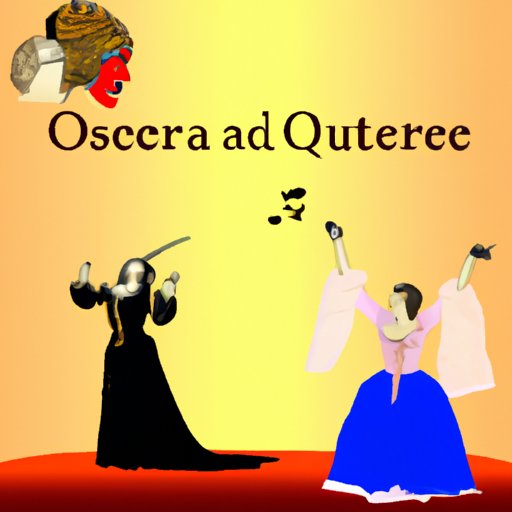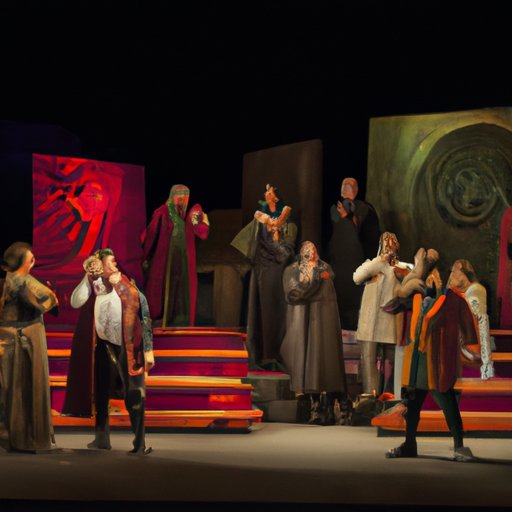Introduction
Opera is an art form that has its roots in the Renaissance period and continues to captivate audiences around the world today. But who invented the opera? To answer this question, we must first establish a definition of what constitutes opera. Generally speaking, opera is a musical performance with singing, instrumental music, and theatrical elements that is usually performed in an opera house.
Although it is impossible to pinpoint the exact moment when opera was invented, there are several key figures whose contributions have shaped the development of this timeless art form. This article will explore the history of opera and look at the influence of early composers on the genre.
Claudio Monteverdi, the Father of Opera
One of the most influential figures in the history of opera is Claudio Monteverdi (1567–1643). He is often referred to as the “father of opera” because of his pioneering work in the genre. Monteverdi was an Italian composer and one of the first to write operas for public performance.
His first opera, L’Orfeo, premiered in 1607 and is considered to be one of the earliest examples of the genre. L’Orfeo was a success and set the standard for future operas. Monteverdi followed up with other works such as Il ritorno d’Ulisse in patria and L’incoronazione di Poppea, both of which were revolutionary in their use of harmony, counterpoint, and dramatic tension.
Monteverdi’s influence on the development of opera cannot be overstated. His works inspired countless composers who came after him and helped to shape the genre into what it is today.
The Development of Opera from its Roots in Greek Tragedy and Commedia dell’arte
The origins of opera can be traced back to ancient Greece, where plays were written to be performed in amphitheaters. These plays combined elements of music, dance, and spoken dialogue, and many of these same elements can be seen in modern-day opera.
In the 16th century, the Italian commedia dell’arte emerged. This form of theatre combined improvisation with scripted scenes, and it was highly influential in the development of opera. The commedia dell’arte featured masked characters that interacted with each other and the audience, and this concept of audience participation was carried over into opera.
In addition to the commedia dell’arte, Ancient Greek theatre had a strong influence on the development of opera. Greek tragedies featured chorus members who sang, chanted, and danced, and this tradition was adopted by early opera composers. The combination of music and drama that is so integral to opera can be traced back to Ancient Greece.

The Influence of Opera on Music and Culture
Since its inception, opera has grown to become a popular form of entertainment. Today, it is enjoyed by people of all ages and backgrounds. Operas are often grand spectacles that combine music, dance, and theatrical elements, and they can evoke powerful emotions in their audiences.
In addition to being a source of entertainment, opera has also had a profound impact on music and culture. Operas often explore themes of love, death, and politics, and they provide a unique insight into the human experience. Many operas have also been adapted into films, further demonstrating the influence of this art form on popular culture.
Other Key Figures in the History of Opera
In addition to Claudio Monteverdi, there were many other important figures in the history of opera. Among them is George Frideric Handel (1685–1759), an influential German-born composer who wrote several famous operas, including Rinaldo, Giulio Cesare, and Alcina. Handel was a master of the Baroque style, and his works continue to be performed today.
Other notable composers who contributed to the development of opera include Wolfgang Amadeus Mozart (1756–1791) and Giuseppe Verdi (1813–1901). Mozart wrote several operas, including The Magic Flute and Don Giovanni, while Verdi composed Rigoletto, La Traviata, and Aida, among others. These works remain some of the most popular operas to this day.
The history of opera is filled with the contributions of many great composers, and their works have influenced generations of musicians. Contemporary composers such as Philip Glass and John Adams have also made significant contributions to the genre.
Conclusion
Opera is an art form that has its roots in the Renaissance period and continues to captivate audiences around the world today. Although it is impossible to pinpoint the exact moment when opera was invented, there are several key figures whose contributions have shaped the development of this timeless art form, such as Claudio Monteverdi, George Frideric Handel, Wolfgang Amadeus Mozart, and Giuseppe Verdi.
Opera has had a profound impact on music and culture. It has grown to become a popular form of entertainment and provides a unique insight into the human experience. The works of early composers continue to inspire and influence contemporary ones, and opera remains an integral part of the music and cultural landscape.
(Note: Is this article not meeting your expectations? Do you have knowledge or insights to share? Unlock new opportunities and expand your reach by joining our authors team. Click Registration to join us and share your expertise with our readers.)
